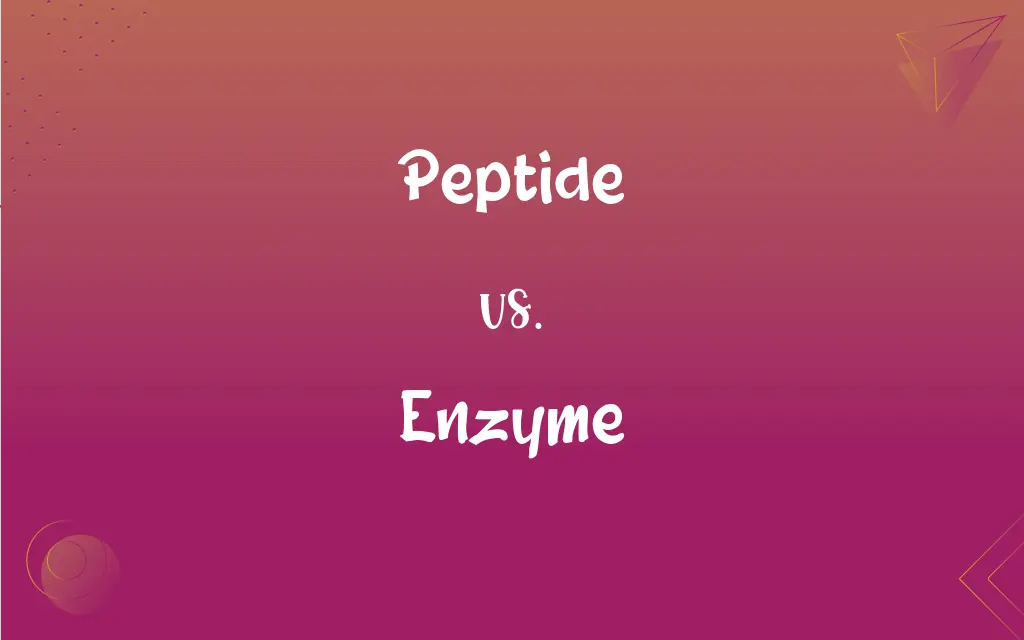Peptide vs. Enzyme: What's the Difference?
Edited by Aimie Carlson || By Harlon Moss || Updated on November 22, 2023
"Peptide" is a molecule formed by linking amino acids; "enzyme" is a protein that catalyzes biochemical reactions.

Key Differences
Peptides are short chains of amino acids linked by peptide bonds, serving various functions in the body. Enzymes, which are also made up of amino acids, act as catalysts in speeding up biochemical reactions.
The structure of a peptide is simpler and smaller compared to enzymes, which have complex, larger structures. Enzymes are functional proteins that are crucial for metabolic processes.
Peptides play roles in signaling and regulation in the body, often acting as hormones. Enzymes, however, are involved in facilitating reactions, like digestion and cellular metabolism.
The functionality of peptides does not include catalytic activity, unlike enzymes that are specifically designed to catalyze reactions.
Peptides are basic building blocks of proteins, while enzymes are specialized proteins that accelerate chemical reactions.
ADVERTISEMENT
Comparison Chart
Basic Definition
Short chains of amino acids
Proteins that catalyze biochemical reactions
Size and Complexity
Smaller, simpler structure
Larger, more complex structure
Primary Function
Signaling, regulation in the body
Facilitating and speeding up reactions
Examples
Insulin, glutathione
Amylase, lactase
Activity
Non-catalytic
Catalytic in nature
ADVERTISEMENT
Peptide and Enzyme Definitions
Peptide
A molecule composed of two or more amino acids.
Collagen peptides are popular in skincare.
Enzyme
A protein that accelerates chemical reactions.
The enzyme lactase helps digest lactose.
Peptide
A compound participating in various biological functions.
These peptides regulate immune responses.
Enzyme
Catalysts in biological systems.
Enzymes are essential for metabolism.
Peptide
Often used in pharmaceuticals and biotechnology.
This peptide is crucial in the new medication.
Enzyme
Involved in digestion, metabolism, and many other processes.
Digestive enzymes break down food.
Peptide
A short chain of amino acids linked by peptide bonds.
Peptides in the cream help rejuvenate skin.
Enzyme
Can be inhibited or activated under different conditions.
This enzyme is activated by certain pH levels.
Peptide
A segment of a protein molecule.
Peptides are smaller than proteins.
Enzyme
Specific to certain substrates and reactions.
Each enzyme has a specific function.
Peptide
Any of various natural or synthetic compounds containing two or more amino acids joined by peptide bonds that link the carboxyl group of one amino acid to the amino group of another.
Enzyme
Any of numerous compounds that are produced by living organisms and function as biochemical catalysts. Some enzymes are simple proteins, and others consist of a protein linked to one or more nonprotein groups.
Peptide
(organic compound) Any of a class of organic compounds consisting of various numbers of amino acids in which the amine of one is reacted with the carboxylic acid of the next to form an amide bond.
Enzyme
(biochemistry) A globular protein that catalyses a biological chemical reaction.
Peptide
(chemistry) The peptide bond itself.
Enzyme
(Christianity) leavened bread, as opposed to azyme
Peptide
Amide combining the amino group of one amino acid with the carboxyl group of another; usually obtained by partial hydrolysis of protein
Enzyme
A protein produced by a living organism, capable of catalyzing a chemical reaction. Almost all processes in living organisms require some form of enzyme to cause the reactions to occur at a rate sufficient to support life. There are a very wide variety of enzymes, each specifically catalyzing a different chemical reaction, the sum of which cause the bulk of the physiological changes observed as life processes. Enzymes, like most proteins, are synthesized by the protein-synthetic mechanism of the living cell, at special sites on ribosomes, using the genetic information in messenger RNA transcribed from the genetic instructions stored as nuleotide sequences in the DNA (or in some viruses, the RNA) of the genome. Some examples of enzymes are: pepsin, diastase, rennet, DNA polymerase, invertase, glucose oxidase, protease, and ribonuclease. There are many other types of enzyme.
Enzyme
Any of several complex proteins that are produced by cells and act as catalysts in specific biochemical reactions
FAQs
Can peptides form proteins?
Yes, longer chains of peptides can form proteins.
Are all enzymes proteins?
Yes, all enzymes are made up of proteins.
Are all peptides naturally occurring?
Most are, but they can also be synthesized.
What is a peptide bond?
It's the chemical bond formed between amino acids in peptides.
What is an enzyme substrate?
It's the molecule upon which an enzyme acts.
What's the difference between a peptide and a polypeptide?
Polypeptides are longer chains of amino acids compared to peptides.
Are peptides found in skincare products?
Yes, they're used for their rejuvenating properties.
Are enzymes used in detergents?
Yes, for breaking down stains.
What role do enzymes play in digestion?
They break down food into absorbable nutrients.
How do enzymes work in the body?
They speed up biochemical reactions necessary for life.
Can enzymes be denatured?
Yes, extreme temperatures or pH levels can denature enzymes.
What happens when enzyme function is impaired?
It can lead to metabolic disorders.
Are enzymes specific to each reaction?
Yes, each enzyme is specific to a particular reaction.
Can peptides act as neurotransmitters?
Some peptides have neurotransmitter-like functions.
Do peptides have a hormonal function?
Yes, some peptides act as hormones.
Do peptides have a structural role?
They can, especially as parts of larger proteins.
Can peptides be synthesized artificially?
Yes, peptides can be synthesized in labs.
Can enzyme activity be regulated?
Yes, by various factors like temperature and pH.
Is insulin a peptide?
Yes, insulin is a peptide hormone.
How are enzymes named?
Often based on the reaction they catalyze, with a suffix "-ase."
About Author
Written by
Harlon MossHarlon is a seasoned quality moderator and accomplished content writer for Difference Wiki. An alumnus of the prestigious University of California, he earned his degree in Computer Science. Leveraging his academic background, Harlon brings a meticulous and informed perspective to his work, ensuring content accuracy and excellence.
Edited by
Aimie CarlsonAimie Carlson, holding a master's degree in English literature, is a fervent English language enthusiast. She lends her writing talents to Difference Wiki, a prominent website that specializes in comparisons, offering readers insightful analyses that both captivate and inform.































































